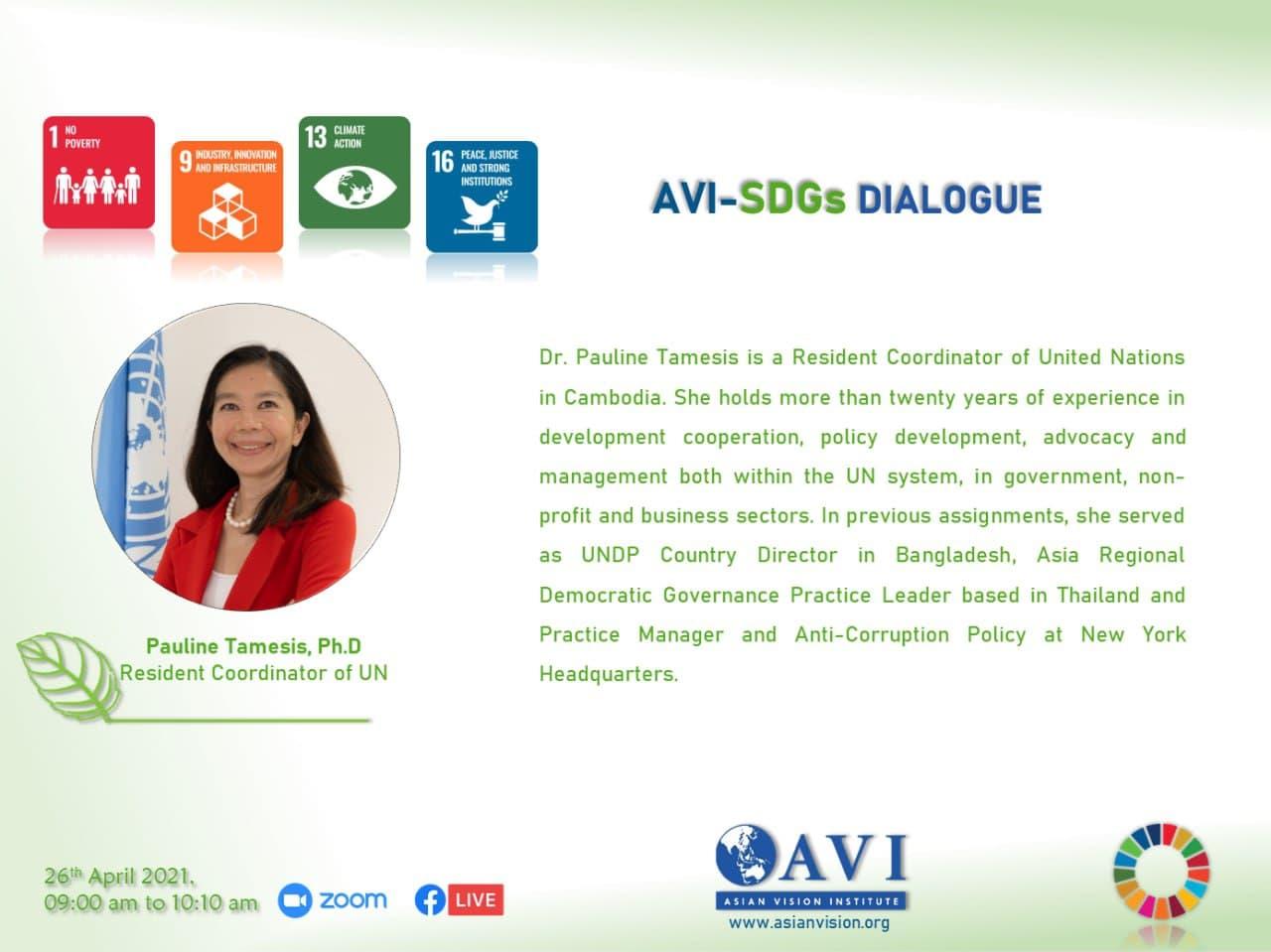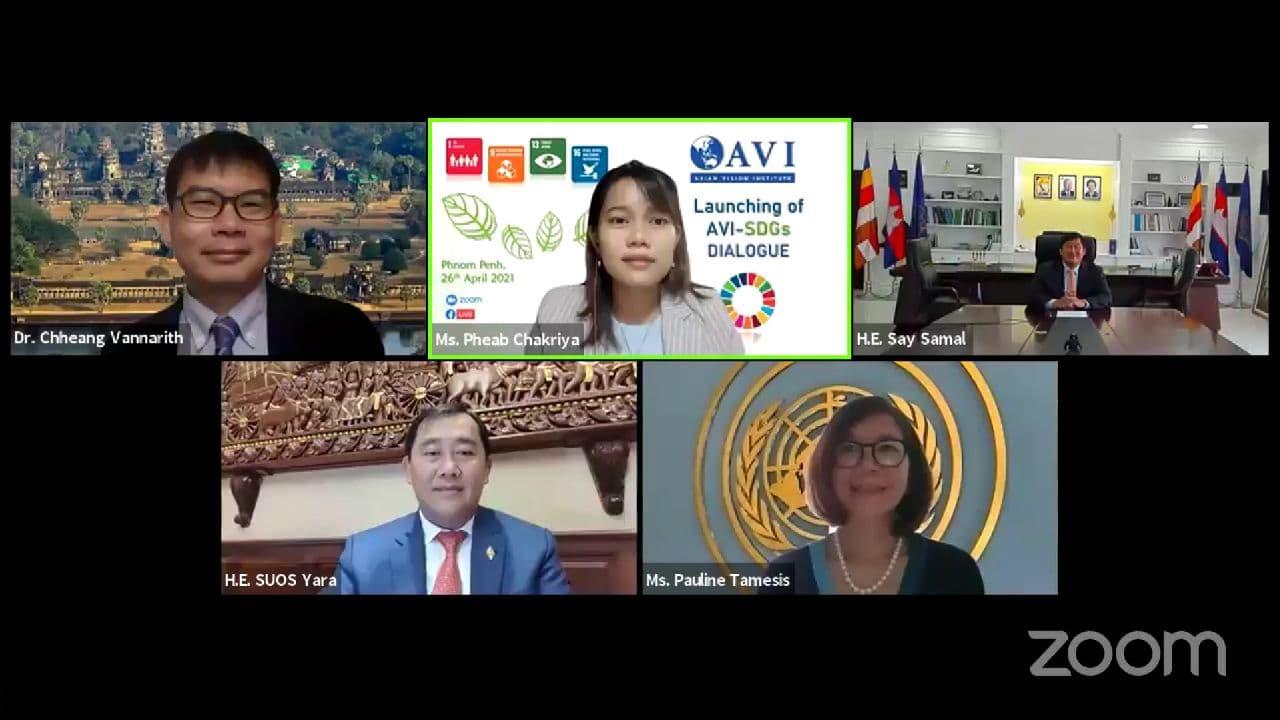Phnom Penh (FN), Apr. 26 – Below is the remarks of the United Nations Resident Coordinator to Cambodia Pauline Tamesis at the launching of the Asian Vision Institute SDG Dialogue, held online on Monday, 26 April.
- H.E. Say Samal, Minister of Environment and Chair of the National Council for Sustainable Development
- H.E. Suos Yara, Member of Parliament, Vice-Chairman of Commission on Foreign Affairs, International Cooperation, Information and Media, and Director-General of the Asian Cultural Council
- Dr Chheang Vannarith, President of AVI
Excellencies, ladies and gentlemen, friends and colleagues;
I am very encouraged and excited to see the Asian Vision Institute, under Dr Vannarith’s leadership, focus their expertise and policy influence on Cambodia’s Sustainable Development Goals. And that we also have today such high-level participation from HE Say Samal and HE Suos Yara, who can lead our discussions on both the substance of the sustainable development and the politics, the political developments that are at the heart of the 2030 agenda.
The Cambodian SDGs, under the Royal Government’s guidance, have been tailored to the country’s needs and expanding, adding a critical 18th SDG – a landmine free Cambodia, due by 2025 – a subject that we know is close to the PM’s heart, having experienced the horrors of war first-hand and its lasting consequences. In fact, so well aligned are the Cambodian SDG’s to national priorities, that when the UN helped the Ministry of Planning to create a monitoring and evaluation system for the National Strategic Development Plan, we took many of these same SDG indicators to serve in the NSDP.
Our objective today and that of the coming dialogues is to put forward practical policy options, that help us meet the challenges ahead and bring us further towards achieving the 2030 goals. In that respect, I would like to suggest three areas of rich policy opportunities. Each presents ways that Cambodia can accelerate prosperity for all in the short to medium term but does so in a way that doesn’t rob future generations, our children and our grandchildren’s children of the natural ecosystems, biodiversity and wealth of our planet. Instead, these are policy options that ensure that the country we hand on to them is prosperous, secure and better prepared to withstand the shocks that they will inevitably face.
First, on ending poverty, SDG1, reducing inequality, SDG10, and those that focus on building prosperity. We have learned a lot in the past year through COVID-19’s shock to our society and economy. The Royal Government rolled out a cash transfer programme under the ID Poor system, for the first time, to more than 3.2 million people in a matter of a few weeks. This was a remarkable achievement and of which this Government is justly proud. I am pleased that the UN played a supporting role in this effort.
Our economic modelling, led from the UN side by UNDP, and in partnership with the Ministry of Economy and Finance showed how social protection spending reduces poverty by more than 4%, and through a positive shock to demand, improves GDP by almost 1%. When people are kept out of poverty, they not only have those rights and dignity protected, they can participate in the wider economy and that benefits everyone. The experience has made clear how social protection is not a cost or a drag on prosperity, but an investment in people that helps create a more dynamic, inclusive and robust economy.
UNDP is following up with new research on the cash transfer programme, and I am pleased to be able to share this with you now. You’re the first to hear this. We asked recipients and non-recipients, at or below the poverty line, how they perceived their Government. Those receiving the ID Poor cash transfer were strongly more positive in their perception of Government – approval rose from around 85% to almost 100%. There is an important role for social protection in creating social solidarity – a highly valuable political asset. A nation that grows together, where everyone feels they are valued and have a stake, will achieve much more resilient and stable prosperity.
Second, there is a deeper awareness of what we can gain through recovery from COVID-19 that not just preserves our natural environment, but sees how it can re-enforce our growing prosperity. This addresses SDG13 on the climate crisis and those SDGs focused on protecting our planet.
To paraphrase US President Biden, when I think about green growth, I think about jobs. The old ideas of the trade-off between growth and environmental protection are a myth and a dangerous one at that. I hope HE Say Samal will allow me, but to cite some research we are currently reviewing with the National Council for Sustainable Development: each dollar invested in green growth in Cambodia, as opposed to carbon economies, produces consistently higher levels of GDP. It creates not just more jobs, but jobs with higher skills. Green technology – the skills needed to produce electric vehicle, solar grids, waste to energy – pushes the workforce into higher productivity and higher wages. The IMF just came out with similar findings globally: clean energy investments produce between 2 and 7 times the GDP than those in brown energy. In addition, as countries and companies around the world are adopting carbon neutrality targets, international investments are moving away from locations with a brown energy mix. Some of the largest buyers in the garment sector in Cambodia have publicly expressed their concerns on this issue.
The Government has already made some smart investments towards a greener economy – upgrading the electricity grid to be more adaptable and resilient allows greater use of wind and solar. Minister Say Samal has opened up the possibility of millions of dollars of reference level payments under the REDD+ carbon credit scheme. But other policy decisions on coal-fired power stations and the sale of large areas of protected forests point in the opposite direction. You could say we’re at a decision point – are we best off with brown old technology, accepting lower future growth – or do we go for the new technology, and green growth? I’m well aware of just how difficult the political economy problems are preventing a green growth direction, but the gains are so great, I think a positive outcome is more than possible.
Finally, the SDG’s are a political statement. They are suffused with values of inclusion and equity – leave no one behind, achieve gender equity. In SDG16 there is the commitment to fundamental freedoms, tying the SDGs back to human rights. The governance issues in SDG16 are at the centre of the Royal Government’s Rectangular Strategy. In some ways, the governance and human rights issues is not only my final area for policy recommendations but also key to making my other recommendations on prosperity and sustainability possible. Creating space for civil society, encouraging participation, creativity and innovation, protected by the rule of law, are good in themselves for the creation of peace and justice. They also help make for a more dynamic and participatory society and economy.
I trust that these SDG dialogues will make a useful contribution as Cambodia considers its policy options in a post-COVID-19 economy, and I look forward to the concrete policy recommendations that will come out of this important work.
Many thanks.
=FRESH NEWS

